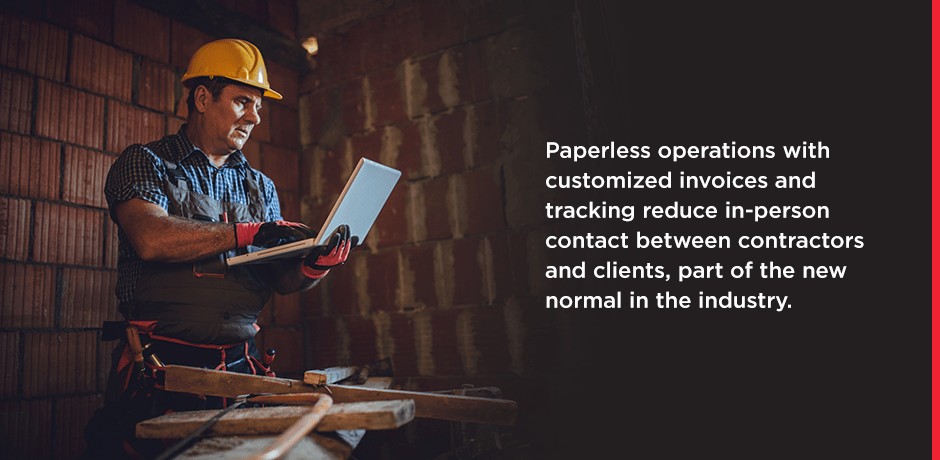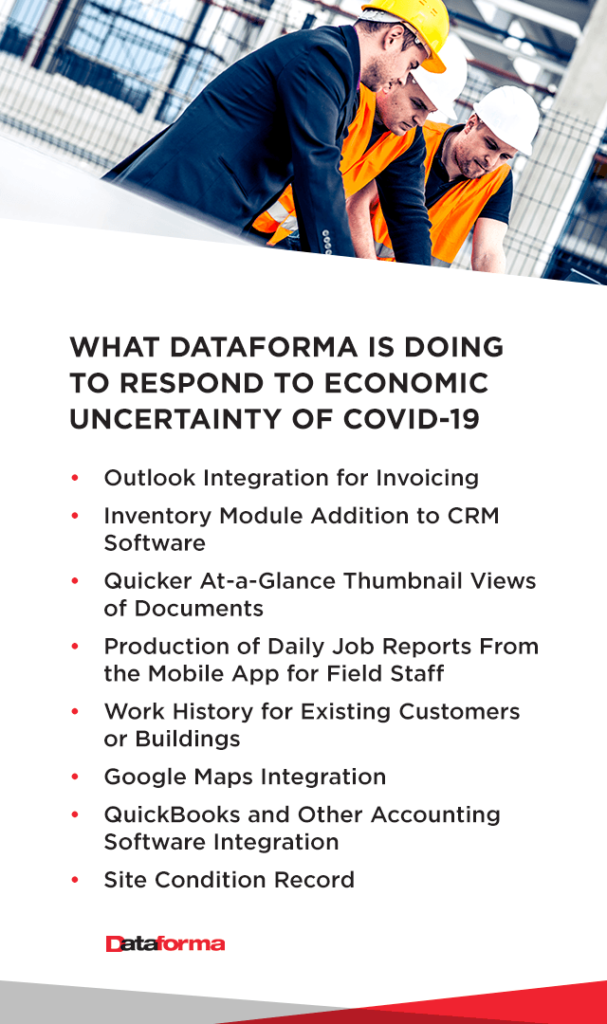
While the most recent form of economic uncertainty manifested from the COVID-19 pandemic, tough times don’t require global disasters to occur. Learning how to maintain contractor success in a bad economy is essential for weathering such storms. Technology can assist those in construction, roofing, solar and similar sectors stay afloat. However, knowing how to use the technology is essential for remaining in business before, during and after economic crises.
Adapting to Field Service Before, During and After the COVID-19 Pandemic
COVID-19 had a serious impact on many sectors. However, service industries, such as construction and roofing, have survived the pandemic by adapting their methods. Adaptation contributes to the resiliency of field service businesses, even in the face of economic issues.
Field Services Before COVID-19
Before COVID-19, field service businesses have long been able to thrive because customers need their services regardless of economic times. Natural disasters happen every year, keeping roofing companies, for example, in business. So, does a bad economy impact the roofing industry? It can, but not as severely as other sectors. Roofing companies can thrive in a bad economy, but they are not the only field service industry impacted by economic swings.
Like roofing businesses, HVAC companies, construction businesses and solar panel installers provide services that people need regardless of the economy. Therefore, these businesses may be more resilient, but new projects and upgraded materials may decrease in popularity during economic downturns. Therefore, even these economically strong sectors should have plans for mitigating the effects of recessions.
Changes Made at the Outset of the Pandemic
At the beginning of the pandemic, many states shut down businesses aside from “essential” operations. Even after reopening cautiously, states still required extra safety measures on work sites. For instance, personal protective equipment (PPE) for job sites now included face masks to protect against COVID-19 transmission in addition to standard hard hats.
The Occupational Safety and Health Administration (OSHA) also introduced new rules for maintaining health and safety for workers in the field, producing a fact sheet for those in the construction industry that outlines tips for slowing the spread of the virus. OSHA requirements for the pandemic include shortening in-person meetings as much as possible and requiring employers to provide cloth face coverings for workers who do not need to use respirators.
In the roofing industry, the main organization for the sector, the National Roofing Contractors Association (NRCA), created a single page of COVID-19 resources to help contractors navigate the health, safety and legal implications of the virus.

Working in the New Normal
Over time, living and working under social distancing and mask mandates has evolved into the new normal. Even after the pandemic ends, the changes brought will continue to impact construction sites into the future.
The major changes that happened in field service businesses in the last year have been in the works for years. For instance, the pandemic didn’t cause companies to start using mobile devices for faster and more accurate data transmission at job sites, but it did accelerate the adoption of this tech throughout the industry.
Experts predict web-based meetings and online collaboration will become expected in future construction industry work. The use of technology also includes creating invoices that don’t require in-person interaction. During the pandemic, contactless invoices protected individuals from spreading germs. But the tech also offers a faster way of creating and delivering invoices.
Another major change is the rise in teleworking. Many sectors will move some workers into permanently remote positions. Office space needs will decline, and some companies will benefit from hiring more qualified workers from outside their immediate area to work remotely.
These changes require the right technology to implement and maintain. Not all software products will suffice, and using too many products can reduce efficiency. A cloud-based solution that integrates multiple types of programs into one software with mobile app capability will become the preferred tool in industries that use field contractors.
Are You Using the Right Tools to Manage Your Field Service Business?
Field service businesses need to use the right tools to stay productive, even in uncertain times. You can do some things to make up for a slump in new business, such as reaching out to previous customers or reviewing your company website.
You can also ensure that your company can work productively and continue to offer high-quality customer service when in the field. Mobile apps and the software you use will become some of your most important tools during economic uncertainty.
Paperwork Woes
If your company uses paper invoicing and contracts, you could be losing money. The time required to create, file and access paperwork could put your business at a disadvantage. Instead of wasting time and paper, consider switching to a mobile app that lets you remotely create invoices, bids, inspection reports and more. Using this technology can also improve field service contractor productivity.
Wasted time is not the biggest negative impact of using paper documents, though. Lost paperwork, especially unpaid invoices, could also cost your business. Dataforma integrates with accounting software so you can easily see which clients have and have not paid for their projects. Effortless financial tracking makes it simple to keep your documentation and accounting updated and accurate.
How to Manage Contracting Business From Home
With more people working from home, you might be managing your contracting business from a home office rather than the field. To make the most of the home workspace, you need to communicate effectively with contractors in the field and with customers. Customer relationship management (CRM) software with mobile app access for contractors and a customer portal for clients brings everything contracting businesses need to work from home with the same efficiency and productivity you got from working in an office.

CRM Software Helps Companies to Thrive in Remote Operations
Contractors working in the field with their management operating remotely from home don’t have a central office where they can have meetings to discuss site inspections or work.
However, with Dataforma software, they do have a way to organize information, including pictures and site service history, on a single platform. This software is a centralized CRM solution designed specifically for field service businesses. Message boards allow office staff to find the status of all jobs, wherever they work. Drag-and-drop scheduling makes the process simple for administrative staff. Contractors get immediate notifications of the schedule changes to stay abreast of where they must go.
Additionally, paperless operations with customized invoices and tracking reduce in-person contact between contractors and clients, part of the new normal in the industry. Contractors can also create invoices from wherever they are and include photos or company letterhead.
A robust software solution that meets the needs of remote staff and field contractors helps roofing companies, construction businesses, HVAC providers, solar panel installers and other field service businesses continue to function and thrive in uncertain economic times.

What Dataforma Is Doing to Respond to Economic Uncertainty of COVID-19
To meet the needs of field service businesses, Dataforma spends considerable time each year updating its software. Upgrades include methods for helping roofing contractors and others in the field to manage work data efficiently and easily. These upgrades and others in the works, such as a labor module, help businesses adapt to economic uncertainty now and in the future.
Outlook Integration for Invoicing
Field contractors need to be able to create invoices in the field. With Dataforma’s latest integration of Outlook signatures, invoices are easier than ever to make. Using an Outlook signature that already includes contact information and more speeds creation of invoices. Plus, the signature tailors each invoice to the company’s specific information without the need to retype the data with each invoice created.
While current Outlook email integration remains in the future, the addition of the email program to Dataforma’s project management software will make sending out emails to customers fast and simple.
Inventory Module Addition to CRM Software
Keeping up with inventory from the field changes the game. Field contractors can find out immediately whether the company has needed parts in stock and give customers more accurate job time estimates.

Quicker At-a-Glance Thumbnail Views of Documents
Uploading documents into Dataforma has long been a feature. However, now, each user can view custom-sized thumbnails. Being able to see small previews of each document means users can find the specific form they need faster. In the field, speed makes a difference in the customer’s experience. Anytime a field contractor can do work more accurately and faster, the customer will have a better experience.
Production of Daily Job Reports From the Mobile App for Field Staff
In the first quarter of 2021, Dataforma introduced the ability for field contractors to upload daily job reports using the mobile app. By creating reports from the field, contractors can ensure their accuracy. Plus, since they never need to return to a desktop to create job reports, there is no excuse for forgetting about doing this task. Ultimately, the company and customer will benefit from better mobile operations, including daily job report creation.
Work History for Existing Customers or Buildings
Going to a building for a job requires contractors to know what work your company previously did on the building or for the customer. However, paper documents can easily get lost or present difficulty in searching for needed information.
With Dataforma’s software, contractors can view photos, drawings, diagrams and previous work for an existing customer. Additionally, they can see current and expired warranties on the products or services the customer received. Therefore, they have the information necessary to determine the best options for the customer’s needs.
Google Maps Integration
Contractors don’t have to worry about accidentally typing in the wrong address into their phone’s mapping system to get directions to a job site. With Dataforma’s integration of Google Maps into the software, contractors can tap an address in the system and have the directions from Google Maps immediately created on their phone.
With an address straight from the app and directions generated on the contractor’s mobile phone, the chances of workers getting lost en route and arriving late diminish. Customers will have fewer complaints about late contractors, and workers can reach more job sites by arriving at each on time when they follow accurate directions from their phone.
QuickBooks and Other Accounting Software Integration
Dataforma saves time by preventing workers from entering redundant data into our software and an accounting program. Half of the customers who use Dataforma also have QuickBooks. Now you can export data from our program into QuickBooks, Foundation, ComputerEase and Sage products.
Site Condition Record
With the mobile Dataforma app, contractors can quickly take photos from a job site for use with cost estimations of installations or repairs. They can then upload these photos to the app to become part of the permanent record for the work location.
The ability to upload photos quickly to the app allows for faster site inspection and evaluation. Plus, others who work at the job site will have access to the photos and inspection information for reference.
In a time when all workers must stay socially distanced from each other, in-person conversations are less common. However, the need for shared information remains strong, especially in industries that install or repair equipment on-site for customers. All contractors can stay on the same page regarding job site information using the Dataforma mobile app as a common data source for all projects.
Positive User Experiences From Real Contractors in the Field
Dataforma has even more fantastic features. Real contractors currently use the software to improve operations in the field. In fact, many have seen their businesses thrive even during the COVID-19 pandemic.
For instance, Maggie Barrett, President of South Coast Enterprises, likes Dataforma’s constant upgrades and feature additions. She notes that the program is easy to use and a good investment.
Mike Cotterman, President of Cotterman & Company, Inc., reports how easily his field employees learned to use the mobile app. Integrating this app into his business helped to eliminate most of their paperwork issues.
Steve Little, CEO of KPost, in an interview with Dataforma in October 2020, noted that his company was an early adopter of Dataforma software. Early during the pandemic, his company’s executive team learned new efficient operations. Plus, the program solved the problem of how to manage a roofing business from home without losing productivity.

Learn More About How to Manage a Field Services Business From Home With a Free Demo of Dataforma
To manage a contracting business from home, you need to have the right tools. Software that adapts to mobile technology is key for field services staff to stay connected to the information they need.
Get a free, 15-minute demo of Dataforma to learn how this CRM solution can help your company stay successful even through the toughest of economic times by helping you to adapt to changes.








